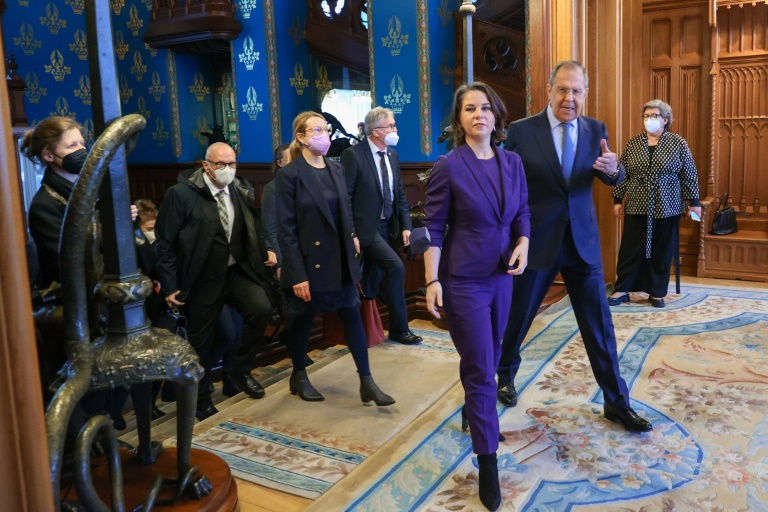Moscow on Tuesday rejected fresh talks on Ukraine unless the West responds to its demands, as the US and NATO pushed for more negotiations to avert a possible Russian invasion of its pro-Western neighbour.
With tens of thousands of Russian troops massing on Ukraine’s borders, efforts have intensified to prevent a conflict and US Secretary of State Antony Blinken was preparing to fly to Kyiv for talks on Wednesday.
Blinken’s trip, which will also take him to Berlin for meetings with European allies, is the latest in a diplomatic effort to prevent tensions over Ukraine from escalating into a new European war.
The White House said Russia was poised for a potential attack on Ukraine that could come at “any point”, warning the US response would include all options.
“No option is off the table,” Press Secretary Jen Psaki told reporters, warning of an “extremely dangerous situation”.
Talks in Geneva, Brussels and Vienna last week failed to ease fears, with Russia insisting its demands for sweeping security guarantees — including a permanent ban on Ukraine joining NATO — be taken seriously.
In a call with Russian Foreign Minister Sergei Lavrov ahead of his trip, Blinken “stressed the importance of continuing a diplomatic path to de-escalate tensions,” State Department spokesman Ned Price said.
A readout from the Russian foreign ministry said Lavrov told Blinken that Moscow needs “concrete article-by-article” responses “as soon as possible”.
He called on Blinken “not to replicate speculation about the allegedly impending ‘Russian aggression'”.
Earlier, Lavrov said at a joint press conference with visiting German Foreign Minister Annalena Baerbock there would be no further negotiations until the West responds.
Washington has rejected the demands, including limits on allied deployments in former Warsaw Pact allies like Poland and the ex-Soviet Baltic states that joined NATO after the Cold War.
NATO chief Jens Stoltenberg left the door open to more talks, saying he had invited Russia and NATO allies to a series of discussions in the NATO-Russia Council “in the near future”.
The aim is to “address our concerns but also listen to Russia’s concerns, and to try to find a way forward to prevent any military attack against Ukraine,” Stoltenberg told a news conference in Berlin.
The State Department said Blinken would fly to Ukraine and meet with President Volodymyr Zelensky on Wednesday, to “reinforce the United States’ commitment to Ukraine’s sovereignty and territorial integrity”.
– Belarus military drills –
Blinken will then head to Berlin on Thursday for four-way talks with Britain, France and Germany.
They will discuss “joint efforts to deter further Russian aggression against Ukraine, including… readiness to impose massive consequences and severe economic costs on Russia,” Price said in a statement.
Blinken and Lavrov are then to meet in Geneva Friday, a US official said.
Ukraine, the US and European countries have raised deep concerns over Russia’s troop build-up, despite repeated denials from Moscow that an invasion is planned.
However, Ukraine’s Foreign Minister Dmytro Kuleba said Tuesday the situation was “under control, so please don’t panic”.
Kyiv has been at war with pro-Moscow separatists in Ukraine’s east since 2014, when Russia annexed the Crimean peninsula after demonstrations ousted a Kremlin-aligned leader.
Adding to the tensions, Russia and Ukraine’s neighbour Belarus on Tuesday launched snap military exercises.
The Belarusian defence ministry said it was hosting the drills because of the continuing “aggravation” of military tensions, including on its western and southern borders.
Ukraine borders Belarus to the south and NATO member Poland to the west.
Neither Moscow nor Minsk has disclosed the number of troops involved, but video published by Belarus showed military vehicles including tanks being unloaded from trains.
– Warning from Turkey –
NATO member Turkey also warned Moscow against invading Ukraine, with President Recep Tayyip Erdogan saying Tuesday he intends to discuss rising tensions with Russian President Vladimir Putin.
Erdogan told reporters in Albania an invasion was not “a realistic option” because “Ukraine is a powerful country”.
Turkey has supplied combat drones to Ukrainian forces, drawing fierce criticism from Moscow.
Russian negotiators met separately this month with delegations from the United States, NATO and the Organization for Security and Co-operation in Europe (OSCE), in meetings that ended inconclusively.
British Defence Secretary Ben Wallace announced in parliament Monday that Britain is sending weapons to Ukraine.
The types of equipment being sent “are not strategic weapons and pose no threat to Russia,” he said, describing them as “light, anti-armour, defensive weapon systems”.
Moscow labelled the shipments “extremely dangerous”.











